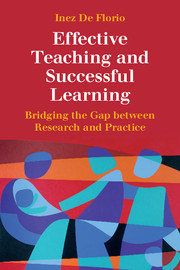Book contents
- Frontmatter
- Epigraph
- Contents
- Preface
- Introduction
- 1 Main Features of Scientific Research on Education
- 2 Important Types of Scientific Research on Education
- 3 Main Features of Evidence-based Research on Education
- 4 Meta-Analyses on Education
- 5 A Synthesis of Over 800 Meta-Analyses Relating to Achievement
- 6 Scaffolding Effective Teaching and Successful Learning
- 7 Planning and Starting the Lesson
- 8 Presenting Knowledge and Skills – Assertive Questioning
- 9 Guided and Independent Practice
- 10 Cooperative and Project-based Learning
- 11 Feedback – Reciprocal and Informative
- Concluding Remarks: Standards Need More Evidence
- References
- Index
5 - A Synthesis of Over 800 Meta-Analyses Relating to Achievement
Published online by Cambridge University Press: 05 June 2016
- Frontmatter
- Epigraph
- Contents
- Preface
- Introduction
- 1 Main Features of Scientific Research on Education
- 2 Important Types of Scientific Research on Education
- 3 Main Features of Evidence-based Research on Education
- 4 Meta-Analyses on Education
- 5 A Synthesis of Over 800 Meta-Analyses Relating to Achievement
- 6 Scaffolding Effective Teaching and Successful Learning
- 7 Planning and Starting the Lesson
- 8 Presenting Knowledge and Skills – Assertive Questioning
- 9 Guided and Independent Practice
- 10 Cooperative and Project-based Learning
- 11 Feedback – Reciprocal and Informative
- Concluding Remarks: Standards Need More Evidence
- References
- Index
Summary
By drawing on the examples of the meta-analyses compiled by Seidel and Shavelson (2007) and Marzano (1998), as different as their overall aims may be, we have got a sense of the difficulties connected with carrying out such extensive and complex syntheses. Marzano, who limits his meta-analysis to teaching strategies, neglecting import issues such as classroom management and curriculum design, nevertheless does not neatly separate the high-yield strategies he propagates. It is probable that the primary studies he incorporated into his meta-analysis did not allow for a clearer distinction. For teachers and their learners there is a huge difference between summarizing and note-taking and between homework and practice (see Section 4.4, strategies no. 2 and no. 4). How could someone think of synthesizing all available empirical research on education? In what way and to whom may such condensed findings be useful?
In the preceding chapters it is underscored more than once that this research-based guide to effective teaching and successful learning does not follow a “cookbook” approach. You will not find recipes or even ready-made powdered soups instructing you to “just add water” for two main reasons: First, teaching and learning are complex and multilayered; second, from my point of view, recipes undermine the personality of teachers and students.
That is why you will not find in this chapter (as in the whole book) clear-cut judgments and prescriptions. Hattie's study and the following publications deserve a differentiated and detailed consideration in order to make evident for teachers where to rely on Hattie's suggestions – above all his teaching model – and where to be aware of the limitations of his research findings. On the whole, Hattie's scientific endeavor to synthesize all available research into achievement is a great contribution to the field of education. Nevertheless, there are numerous pitfalls, partly inherent in such a gigantesque enterprise and partly due to Hattie's research interests.
HATTIE'S STUDY VISIBLE LEARNING
As previously mentioned, John Hattie, an educationalist from New Zealand who specialized in statistics and psychometrics, compiled a mega-analysis. His study, entitled Visible Learning, synthesized over 800 meta-analyses relating to achievement (Hattie, 2009), and Hattie is still collecting. In his guide Visible Learning for Teachers, published three years later, he had already arrived at about 930 meta-analyses, with no end in sight (Hattie, 2012).
- Type
- Chapter
- Information
- Effective Teaching and Successful LearningBridging the Gap between Research and Practice, pp. 79 - 93Publisher: Cambridge University PressPrint publication year: 2016



